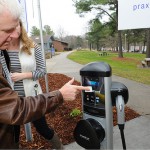Tax subsidies for mass transit riders shrink in 2014
December is over, and pocketbooks should be regaining their former heft as the costs typically associated with the holidays expire. Not so for mass-transit riders. Before 2013 ended, Congress shrank the allowed amount of pre-tax income that employers could set aside for staff who commute to work on public transit.
The drop from $245 to $130 per month represents a decrease of almost 47 percent. In the D.C. area, where roughly 500,000 workers have been affected by the change, says Dan Nueburger, president of Commuter Services for Wage Works, a company that helps businesses administer the federal benefits, commuting expenses will rise by $550.

Long day’s journey into night: America cuts its already meager public transit commuter subsidy, while maintaining its subsidies for motorists. From Marcin Wichary.
“This potentially has a devastating effect on ridership as people decide to take other modes of transportation to get to work,” Tom Downs, board chair of directors, said at a recent board meeting for Metro, the transit authority for the nation’s capital. His organization has blamed revenue losses in part on subsidy cuts for mass-transit riders; 40 percent of Metro’s riders during peak periods are federal employees whose rides are subsidized.
The tax benefits for commuters, defined as those who use mass transit and those who drive to work, has been in place since 1998, historically favoring motorists because allowed amounts for them have been higher. Yearly adjustments due to cost-of-living expenses only widened the gap between the two commuting groups until 2009, when the economic stimulus package briefly put the two on equal footing.
But in 2011, the subsidy for both groups was capped at $230 before dropping to $130 the following year. “Fiscal cliff” negotiations last year raised the amount to $245, which Congress allowed to be retroactive to 2012. Because the benefit requires employers to deliver special, prepaid cards to each worker monthly, the retroactive provision created bureaucratic headaches that would be duplicated this year if Congress decides to raise the subsidy for mass-transit riders so that it equals what was passed for drivers, who saw their benefit rise from $245 to $250.
“Unfortunately, many people will lose not only the January, February, and March tax break but probably April, too,” said Neuberger.
Even if Congress can address the disparity in the subsidies by March, as supporters hope, it will take weeks for companies to administer the benefits, says Neuberger. It’s possible most commuters won’t see the higher tax break until later in the spring.
“It’s a huge administrative burden to then go figure out retroactively what someone’s commute would’ve cost,” said Neuburger. “So companies just didn’t want to do it. They lost the tax savings, and the employees lost the tax savings.”
Employers, who must choose to participate in the program so that their workers can opt in, may also lose money: if staff can’t deduct as much from their paychecks as before, then employers pay higher payroll taxes.
Lawmakers hoping for a compromise have created a bill with bipartisan support. The proposal recommends a maximum of $220 that can be deducted monthly for parking, transit, and even bike-sharing transit modes. Whether it passes remains in question.
Related Posts
Category: Regulations

















